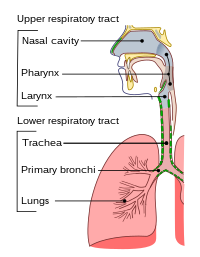
Photo from wikipedia
INTRODUCTION Bacterial resistance burden has increased in the past years, mainly due to inappropriate antibiotic use. Recently it has become an urgent public health concern due to its impact on… Click to show full abstract
INTRODUCTION Bacterial resistance burden has increased in the past years, mainly due to inappropriate antibiotic use. Recently it has become an urgent public health concern due to its impact on the prolongation of hospitalization, an increase of total cost of treatment and mortality associated with infectious disease. Almost half of the antimicrobial prescriptions in outpatient care visits are prescribed for acute upper respiratory infections, especially rhinosinusitis, otitis media, and pharyngotonsillitis. In this context, otorhinolaryngologists play an important role in orienting patients and non-specialists in the utilization of antibiotics rationally and properly in these infections. OBJECTIVES To review the most recent recommendations and guidelines for the use of antibiotics in acute otitis media, acute rhinosinusitis, and pharyngotonsillitis, adapted to our national reality. METHODS A literature review on PubMed database including the medical management in acute otitis media, acute rhinosinusitis, and pharyngotonsillitis, followed by a discussion with a panel of specialists. RESULTS Antibiotics must be judiciously prescribed in uncomplicated acute upper respiratory tract infections. The severity of clinical presentation and the potential risks for evolution to suppurative and non-suppurative complications must be taken into 'consideration'. CONCLUSIONS Periodic revisions on guidelines and recommendations for treatment of the main acute infections are necessary to orient rationale and appropriate use of antibiotics. Continuous medical education and changes in physicians' and patients' behavior are required to modify the paradigm that all upper respiratory infection needs antibiotic therapy, minimizing the consequences of its inadequate and inappropriate use.
Journal Title: Brazilian journal of otorhinolaryngology
Year Published: 2018
Link to full text (if available)
Share on Social Media: Sign Up to like & get
recommendations!